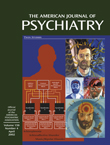To the Editor: Nerve growth factor is the best characterized neurotrophin essential for neuron survival, differentiation, and function in the peripheral and central nervous systems
(1). In addition, it is hypothesized that nerve growth factor plays a modulatory role in the immune system, is involved in the regulation of specific neuroendocrine functions, and is elevated in psychologically stressful situations
(1). Because acute nicotine withdrawal is associated with psychological stress, and an elevation of nerve growth factor has been shown to also accompany alcohol withdrawal
(2), we hypothesized that the level of nerve growth factor is elevated during withdrawal from smoking.
We studied eight female and seven male smokers (mean age=35.0 years, SD=10.7) and 10 matched pairs of nonsmokers. All of the subjects gave their written informed consent. The smokers had consumed more than 10 cigarettes a day for 5 or more years and had been medication free within the past year. Having any psychiatric or medical disorder led to exclusion from the study. Their grade of nicotine dependence was measured with the Fagerstrom Tolerance Questionnaire
(3). Serum concentrations of nerve growth factor were measured in smokers on 3 consecutive days at the same time of day (within 15 minutes) and once in nonsmokers. On days 1 and 3, the smokers consumed at least eight cigarettes before blood was drawn; on day 2 they were abstinent for 16 hours or more. Measurement on day 3 was performed to detect delayed changes in nerve growth factor level.
No significant difference was detected in baseline levels of nerve growth factor between the smokers (mean=63.4 pg/ml, SD=117.8) and the nonsmokers (mean=57.3 pg/ml, SD=96.6) (Mann-Whitney-Wilcoxon S=137.0, df=14, exact p=0.71). Our main finding was a significant overall change in nerve growth factor levels in the smokers over the 3 days observed (Friedman S=7.56, df=2, exact p=0.02). Post hoc analysis revealed a significant increase in nerve growth factor levels between day 2 (mean=76.3 pg/ml, SD=176.3) and day 3 (mean=104.5 pg/ml, SD=266.4) (Wilcoxon S=39.50, df=14, exact p=0.03, with Bonferroni correction). Fagerstrom score was positively correlated with nerve growth factor level at baseline (Spearman’s r=0.53, df=13, p=0.04) but not with change in nerve growth factor level.
In line with this observation, a release of nerve growth factor into the bloodstream was found in adult male mice in social isolation as well as in parachutists experiencing their first jump, suggesting that psychological stress is associated with an increase in serum level of nerve growth factor
(1). Moreover, high levels of serum nerve growth factor in patients during acute withdrawal from alcohol or heroine addiction
(2) indicate involvement of nerve growth factor in addictive behavior and withdrawal distress. The positive correlation found between Fagerstrom score and nerve growth factor concentration strengthens the possibility of a connection with addictive behavior. This study represents, to our knowledge, the first observation that the serum concentration of nerve growth factor is altered during acute withdrawal from nicotine, although this finding must be considered as preliminary and needs replication.

